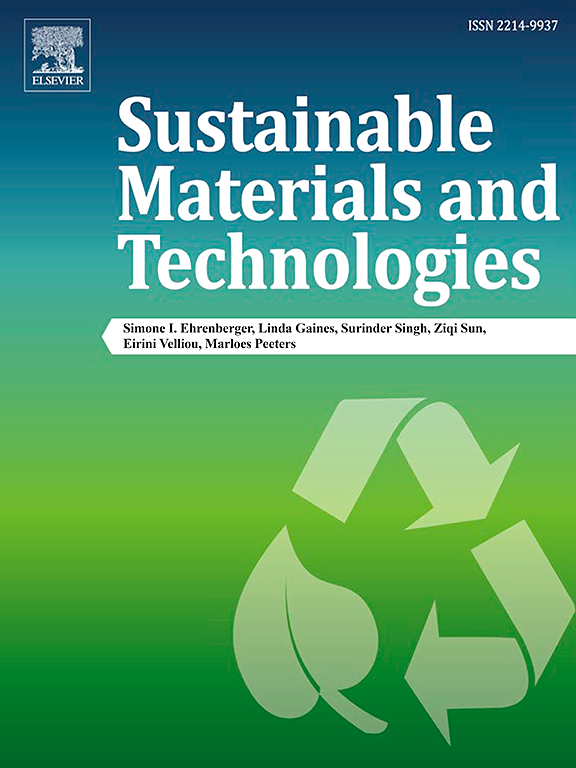Optimized biochar and SCMs for improved mechanical properties and sustainability of engineered/strain-hardening cementitious composites (ECC/SHCC)
IF 9.2
2区 工程技术
Q1 ENERGY & FUELS
引用次数: 0
Abstract
Engineered Cementitious Composites (ECC) exhibit excellent ductility and crack resistance but rely heavily on cement consumption, limiting their environmental and economic sustainability. This study systematically investigates the integration of biochar and supplementary cementitious materials (SCMs) into ECC formulations, with a focus on optimizing mechanical performance, life cycle environmental impacts, and cost efficiency. The findings demonstrate that a strategic combination of high fly ash content and moderate biochar incorporation not only maintains, but can enhance, the functional properties of ECC while substantially reducing its carbon footprint. Excessive biochar reduces strength and crack control, emphasizing the importance of dosage optimization. Scenario analysis further reveals that biochar production method significantly influences environmental outcomes, with gasifier-based systems outperforming traditional pyrolysis. As compared to alternatives with ground granulated blast furnace slag and low-fly ash, the high-FA ECC mixes with controlled biochar incorporation present a viable pathway toward sustainable cementitious composites. This study offers a performance-based framework to guide ECC mix design under life cycle and carbon reduction considerations, underscoring the importance of dosage optimization and production method selection in realizing the full potential of biochar as a sustainability additive in cementitious composites.
优化生物炭和SCMs以改善工程/应变硬化胶凝复合材料(ECC/SHCC)的力学性能和可持续性
工程水泥复合材料(ECC)具有优异的延展性和抗裂性,但严重依赖水泥消耗,限制了其环境和经济的可持续性。本研究系统地研究了生物炭和补充胶凝材料(SCMs)在ECC配方中的整合,重点是优化机械性能、生命周期环境影响和成本效率。研究结果表明,高粉煤灰掺量和适度生物炭掺量的策略组合不仅可以保持、提高ECC的功能特性,还可以大幅降低ECC的碳足迹。过多的生物炭降低了强度和裂缝控制,强调了用量优化的重要性。情景分析进一步表明,生物炭生产方法显著影响环境结果,气化炉为基础的系统优于传统的热解。与磨碎的粒状高炉矿渣和低粉煤灰的替代品相比,控制生物炭掺入的高fa ECC混合物是实现可持续胶凝复合材料的可行途径。本研究提供了一个基于性能的框架来指导生命周期和碳减排考虑下的ECC混合料设计,强调了用量优化和生产方法选择在充分发挥生物炭作为胶凝复合材料中可持续性添加剂的潜力方面的重要性。
本文章由计算机程序翻译,如有差异,请以英文原文为准。
求助全文
约1分钟内获得全文
求助全文
来源期刊

Sustainable Materials and Technologies
Energy-Renewable Energy, Sustainability and the Environment
CiteScore
13.40
自引率
4.20%
发文量
158
审稿时长
45 days
期刊介绍:
Sustainable Materials and Technologies (SM&T), an international, cross-disciplinary, fully open access journal published by Elsevier, focuses on original full-length research articles and reviews. It covers applied or fundamental science of nano-, micro-, meso-, and macro-scale aspects of materials and technologies for sustainable development. SM&T gives special attention to contributions that bridge the knowledge gap between materials and system designs.
 求助内容:
求助内容: 应助结果提醒方式:
应助结果提醒方式:


